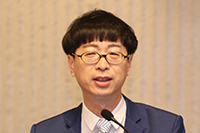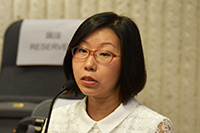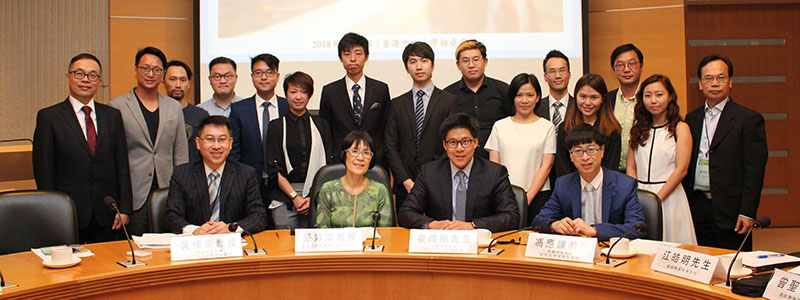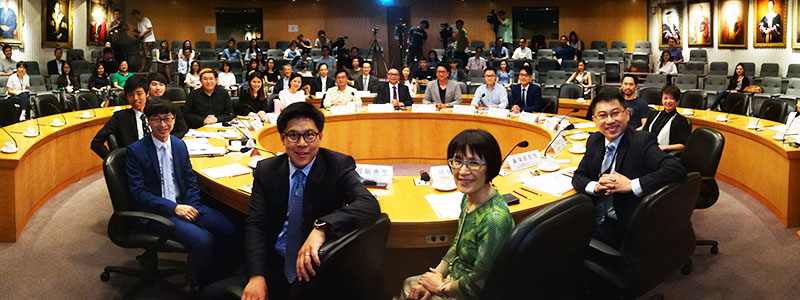
|
|||||||||||||||||||||||||||||||||||||||||||||||||||||||||||||||||||||||||||||||||||||
| Public Policy Forums |
|
|
|
Career Development in the Mainland:
Opportunities and Challenges for Hong Kong Young People 21 June 2018 | 14:30–17:30 | Cho Yiu Conference Hall, CUHK |
|
Speakers |
 Welcome Speech
Welcome SpeechProf. Fanny M. Cheung Pro-Vice-Chancellor, CUHK; Co-Director, HKIAPS  Keynote Speeches
Keynote SpeechesMr Kenneth K. K. Fok Member, The Chinese People’s Political Consultative Conference; Member, Youth Development Commission  Prof. Anthony Y. H. Fung
Prof. Anthony Y. H. Fung
Professor, School of Journalism and Communication, CUHK  Ms Jade W. Y. Lai
Ms Jade W. Y. Lai
Political Assistant to Secretary for Home Affairs, HKSAR Government |
|
Experience Sharing Session
 Mr Ben Kong
Mr Ben KongPolicy Officer, Savantas Policy Institute Mr Andy HoExecutive Director, The Hong Kong Federation of Youth Groups Mr Henry HoConvenor, OCTS Youth Forum Mr Ray LeeCo-Founder, Kreis AI Mr Eric KuoCo-Founder, R-Guardian Mr Ben ChenPhD Student, School of Journalism and Communication, Peking University Ms Elsa ChanExecutive Director, Hok Yau Club Mr Noel TsangResearcher, Our Hong Kong Foundation Mr Jacky FungResearcher, Hong Kong Policy Research Institute Mr Brian WongUnit Manager, AIA Hong Kong Ms Clarisse YeungRepresentative, ARTicipants Mr Harry YipVice President of Business Operations, MioTech Ms Shirley LauFounder, pâtisserie comme moi Mr Bill TangDeputy Director, Rights and Benefits Committee, The Hong Kong Federation of Trade Unions Ms Iris LawFormer President, Women’s Voice Alumni Association, Hong Kong Young Women’s Christian Association |
|
Moderator |
 Prof. Wilson W. H. Wong
Prof. Wilson W. H. Wong
Associate Professor, Department of Government and Public Administration, CUHK |
|
Organizers
Policy Research @ HKIAPS Centre for Youth Studies, HKIAPS, CUHK |
|
As the mainland and Hong Kong have further integrated both economically and socially, increasing numbers of Hong Kong young people are considering developing a career in the mainland. To further understand the opportunities and challenges that Hong Kong young people face in this endeavour, Policy Research @ HKIAPS and the Centre for Youth Studies co-organized a public policy forum titled “Career Development in the Mainland: Opportunities and Challenges for Hong Kong Young People”. Government officials, representatives from NGOs, scholars, key stakeholders, and Hong Kong young people who have studied or worked in the mainland were invited to share their opinions and experiences on Hong Kong’s youth policy and the prospects for Hong Kong young people to develop a career in the mainland. Several policy recommendations were made to encourage Hong Kong young people to pursue careers in the mainland. Mr Kenneth K. K. Fok: “Career Development in the Mainland: Opportunities and Challenges for Hong Kong Young People” Mr Fok observed that since the beginning of China’s move in 1978 to institute reforms and open up the country, the mainland’s development has provided Hong Kong with various opportunities. He shared his grandfather’s experience with running a business in Guangzhou as an example. Forty years ago, Hong Kong young people seized opportunities under what were challenging circumstances in the mainland at the time. They are now leading successful enterprises in different sectors and industries in Hong Kong. Considering the changes that have taken place in the economic structure of mainland China, the country is now at a crossroads. Low-end industries cannot promote future growth, while the development of industries oriented towards the future cannot simply rely on policy support and government subsidies. Mr Fok stressed that in the new era, Hong Kong young people should take advantage of Hong Kong’s priority industries, for instance, the e-sports industry and the arts and culture industry, to satisfy strong demand from mainland consumers. They can seize career and development opportunities in these areas. Mr Fok suggested that policymakers develop different policies at various stages after the return of Hong Kong to Chinese sovereignty in 1997, to encourage Hong Kong young people to develop personal and career paths in the mainland. In the early stage, the primary objective was to increase their understanding of the mainland. Today, further policy improvements should be made to encourage Hong Kong young people to participate in exchange and internship programmes with different themes. This will help them to pursue favourable opportunities for future development. Prof. Anthony Y. H. Fung: “Hong Kong Youth’s Perceptions of the Mainland” Prof. Fung published a study in 2016 on Hong Kong youth’s perceptions of the mainland. In it, he examined the sentiments of the young generation of Hong Kong regarding mainland society, and discussed how their perceptions and experiences of studying and working in the mainland might affect how they feel about going to the mainland for personal development. He pointed out that, although Hong Kong young people are content to develop their career in the mainland over the short term, they resist living and working there over the long term because of several considerations. However, there are in-depth exchange or internship programmes that might yet be attractive to Hong Kong young people. Facilitating exchanges between young people from the mainland and Hong Kong will allow Hong Kong people to gain a deeper understanding of the mainland’s social and economic development and increase their interest in going to the mainland for personal development. Prof. Fung suggested that the HKSAR government set up an inter-institutional coordinating agency to give support to Hong Kong post-secondary students to encourage them to work or undertake internship programmes in the mainland, and to help them to seize opportunities in China. Ms Jade W. Y. Lai: “The Youth Development Policy of Hong Kong” Ms Lai introduced the Youth Development Commission, which was newly established on 1 April 2018. The commission is a high-level steering committee tasked with enhancing policy coordination within the HKSAR government and with enabling a holistic and more effective examination and discussion of issues of concern to young people. The government has been striving to address the concerns of young people about their education, career pursuits, and home ownership, and to encourage their participation in politics, discussions of public policies, and debates. In the session on the sharing of experiences, 15 invited guests from different sectors and industries shared their opinions and experiences on the topic. The policy recommendations that had been proposed were further discussed and all participated in critical discussions on several issues. These included: starting a business on the mainland, the measures announced by the Central Government to assist Hong Kong residents in studying, working, starting businesses, and living on the mainland, as well as the concerns and challenges they have faced when working and living on the mainland. More than a hundred people joined the policy forum. ■ |


